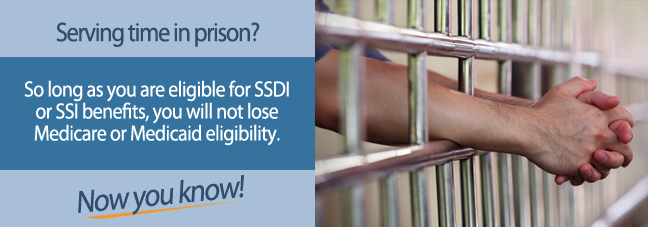
If you go to prison, your benefits change, including Medicaid and Medicare. The Constitution requires prisoners to be given health care while incarcerated under the Eighth Amendment.
Several factors play into how your coverage is affected, depending on your eligibility, whether or not you were enrolled before going to prison, how long you are in prison, and which state you live in. Medicaid and Medicare are affected in different ways if you become incarcerated.
If you know you will be incarcerated for any extended period of time, be prepared to potentially need to reapply for health insurance upon release

If you are enrolled in Medicaid before you went to jail, you may keep your coverage and remain enrolled, but the prison is responsible for any health care services you need, with the exception of inpatient treatment provided by a medical facility not associated with the prison. For example, you may have to go to a hospital while you are in prison. If you leave the prison to be admitted to a hospital for over 24 hours, the care you receive at the hospital can be paid by Medicaid.
This is called the inmate exclusion provision, and it has been improved since the Affordable Care Act passed in 2014. This provision only applies to federal funds like Medicaid, but does not prevent the states from using state funds for prisoner health services. This provision does not require inmates to be terminated from Medicaid upon incarceration.
Many states do terminate Medicaid upon incarceration, but some choose to suspend Medicaid benefits instead. It is better to have your benefits suspended rather than terminated. If your benefits are suspended, once you leave prison, it will be much easier and quicker for you to start receiving benefits once again. If your benefits are terminated, you will have to re-apply for Social Security benefits and Medicaid.
If you are eligible but not enrolled in Medicaid at the time of your incarceration, you can apply for Medicaid while you are in prison and you should be given the resources to do so. That way you can attempt to be covered as quickly as possible once you are no longer incarcerated.
Medicare works a little differently. If you were already receiving Medicare before you went to jail, you will still be eligible for Medicare benefits while in jail. But if you are incarcerated longer than 30 days and are convicted of a crime, any Social Security Disability Insurance payments (usually linked with Medicare) will stop. This doesn’t mean you are no longer eligible. Your incarceration doesn’t affect your eligibility for Medicare.
If you are below retirement age and receive Medicare for disability, your care will be covered again once you leave prison and resume your SSDI benefits. To make this happen as soon as possible, you should contact the Social Security Administration to reinstate your Medicare coverage and SSDI benefits.